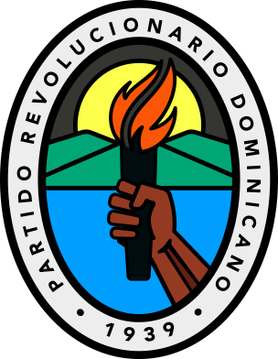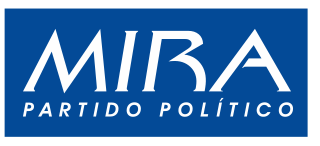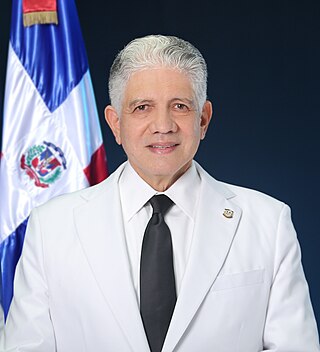
The Peruvian Aprista Party is a Peruvian social-democratic political party and a member of the Socialist International. The party was founded as the American Popular Revolutionary Alliance by Víctor Raúl Haya de la Torre, who originally intended to create a network of anti-imperialist social and political movements in Latin America. Members are called "compañeros" (fellows), based on the fraternity espoused by Haya de la Torre. Originally a centre-left to left-wing party with democratic socialist and nationalist elements, the party moved closer to the political centre under the leadership of Alan García starting in the 1980s, embracing social democracy and later some Third Way policies. In 2006, the party adopted a new platform as García's second presidency implemented a series of policies labelled as centre-right, embracing free-market capitalism, dialogue with other right-wing parties and organizations in the country, and closer ties with the Catholic Church and Evangelical churches.

The Concertación, officially the Concertación de Partidos por la Democracia, was a coalition of center-left political parties in Chile, founded in 1988. Presidential candidates under its banner won every election from when military rule ended in 1990 until the conservative candidate Sebastián Piñera won the Chilean presidential election in 2010. In 2013 it was replaced by New Majority coalition.

The Senate of the Dominican Republic is the upper house in the bicameral legislature of the Dominican Republic, and together with the Chamber of Deputies makes up the Congress.

Leonel Antonio Fernández Reyna is a Dominican lawyer, academic, and was the 50th and 52nd President of the Dominican Republic from 1996 to 2000 and from 2004 to 2012. From 2016 until 2020, he was the President of the EU–LAC Foundation.

Union for Peru is a Peruvian political party founded by Javier Pérez de Cuéllar, an ex-UN Secretary General, in 1994 to run for the presidency of Peru in the 1995 general elections. Originally a social democratic party, the party became the main political home of the Peruvian ethnocacerist movement in the late-2010s after a group led by former Army Major Antauro Humala joined the party. Humala later formed the Patriotic Front in 2018 and contested the 2021 general elections.

The Dominican Revolutionary Party is a political party in the Dominican Republic. Traditionally a left-of-centre party and social democratic in nature, the party has shifted since the 2000s toward the political centre. The party's distinctive color is white. Traditionally, the party has two presidents: the "Titular President" and the "Acting President" ; until 2010 the presidents and the Secretary-General were proscribed to run for any elected office.
Juntos Podemos Más por Chile was a political coalition created in 2003, consisting of the Communist Party of Chile, the Humanist Party, the Christian Left Party of Chile, and several other smaller left-wing organizations.

The Independent Movement of Absolute Renovation is a political party in Colombia, founded in 2000 by 51,095 Colombians led by lawyer and former senator Carlos Alberto Baena and Alexandra Moreno Piraquive. The party also has functions as a non-profit organization. It has representation in the Chamber of Representatives and in the Senate of the Congress of Colombia, and has also participated in the public corporations of Colombia at a regional level, being stated as the eighth-most influential political force in the country.

The Union Party for the People, or Party of the U, is a liberal political party in Colombia. The Party is led by former president Juan Manuel Santos.
The Grand National Alliance, commonly known as the "Alianza Rosada", was a one-time electoral alliance in the Dominican Republic. The alliance was led by the Dominican Revolutionary Party (PRD) and the Social Christian Reformist Party (PRSC). It lost the 16 May 2006 legislative elections.
The Dominican Humanist Party is a minor humanist political party of the Dominican Republic, without parliamentary representation after the 16 May 2006 election. In 2020, it received 0.84% of the vote in all elections that year. Its presidential candidate was Luis Abinader. The president of the Party, elected in 2021, is Ramón Emilio Goris.

The Hospital Metropolitano de Santiago (HOMS) is the largest hospital in the Dominican Republic and one of the most modern hospitals in Latin America and the Caribbean, with 300 doctor's offices, 400 beds, 16 operating rooms, a hotel, and other specialized units.

The Alliance for the Great Change—PPK was an electoral alliance in Peru formed for the 2011 general election to promote the presidential candidacy of Pedro Pablo Kuczynski ("PPK").

The National Solidarity Alliance was an electoral alliance in Peru formed for the 2011 general election, dominated by the eponymous National Solidarity Party and led by presidential candidate Luis Castañeda.

Presidential elections were held in the Dominican Republic on 20 May 2012. They were the fifth quadrennial elections for the presidency and vice-presidency since 1998, when a change in the electoral law separated the presidential from the congressional and municipal elections.

Rafael Eduardo Estrella Virella is a civil engineer and Dominican politician, former senator and president of the Senate of the Dominican Republic from 2020 to 2023. He served as Minister for Public Works and Communications of the Dominican Republic during the second term 1991–94, of President Joaquín Balaguer and also he has served as senator for Santiago from 1994 to 1998, and has been serving again since 2020.
Amable Aristy Castro was a politician and businessman from the Dominican Republic. He was a senior leader of the Social Christian Reformist Party (PRSC) and was a Senator for the province of La Altagracia. Aristy was the presidential candidate for his party in the 2008 presidential election. Due to the remarkable power and influence that he wielded on his native province, he was known as the "Chieftain of Higüey".
The Red Party, also known as the Party of the Regeneration and nicknamed together the Tailed Ones, was a historical Dominican political party from the late 19th century to the mid-20th century founded by Buenaventura Báez. Ramón Cáceres and Horacio Vásquez were the main leaders of this party in the 20th century, and as such, during this time the followers of this party were also known as Horacistas.

The People's Force is a political party in the Dominican Republic led by former President Leonel Fernández.

Virginia María Cornejo is an Argentine politician, currently serving as National Deputy elected in Salta Province. A member of Republican Proposal (PRO), Cornejo was elected in 2019, and currently sits in the Juntos por el Cambio parliamentary inter-bloc. She previously served as a member of the Salta Province Chamber of Deputies from 2005 to 2013, and as a city councillor in her hometown of Salta from 2015 to 2019.

















